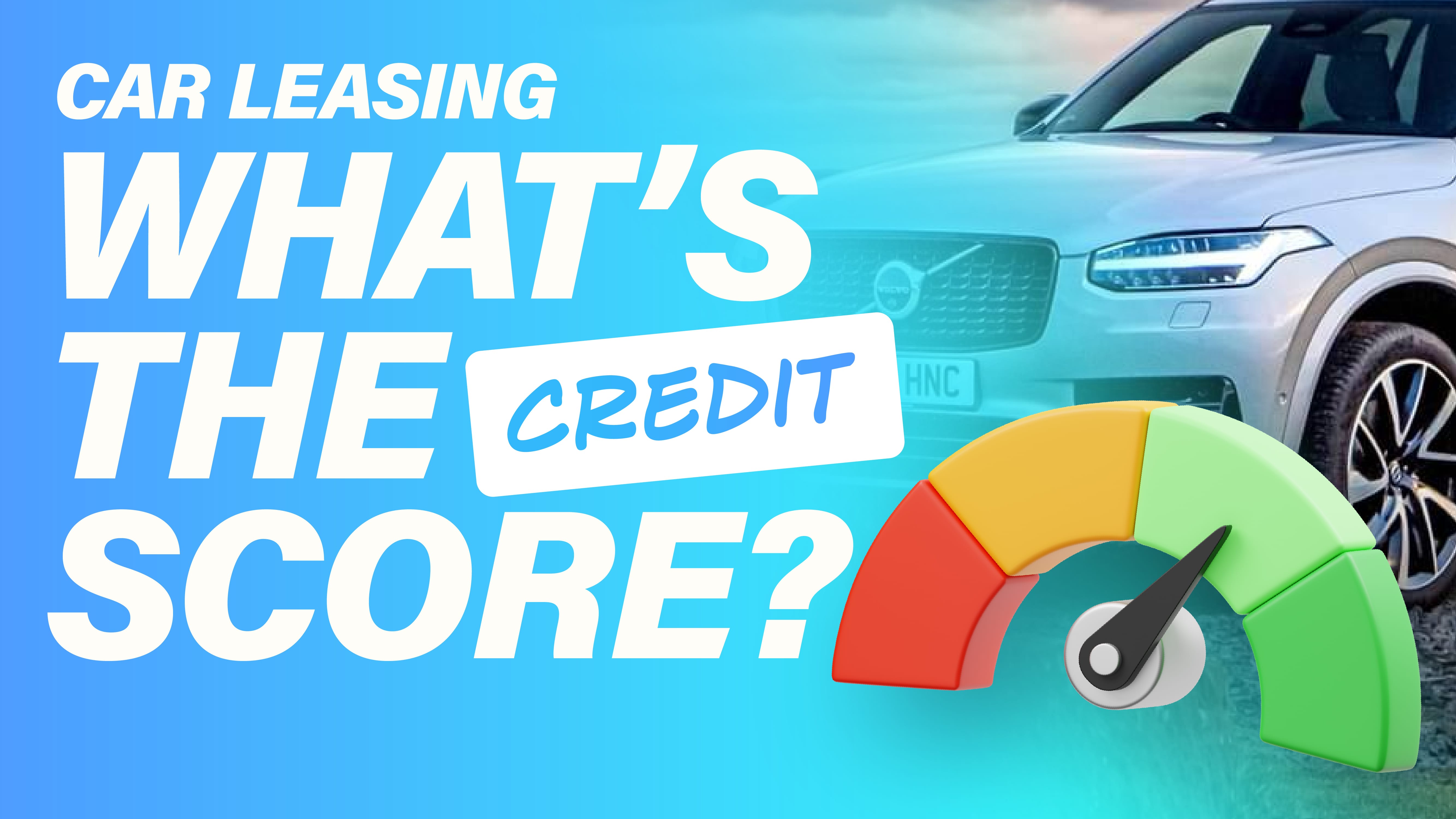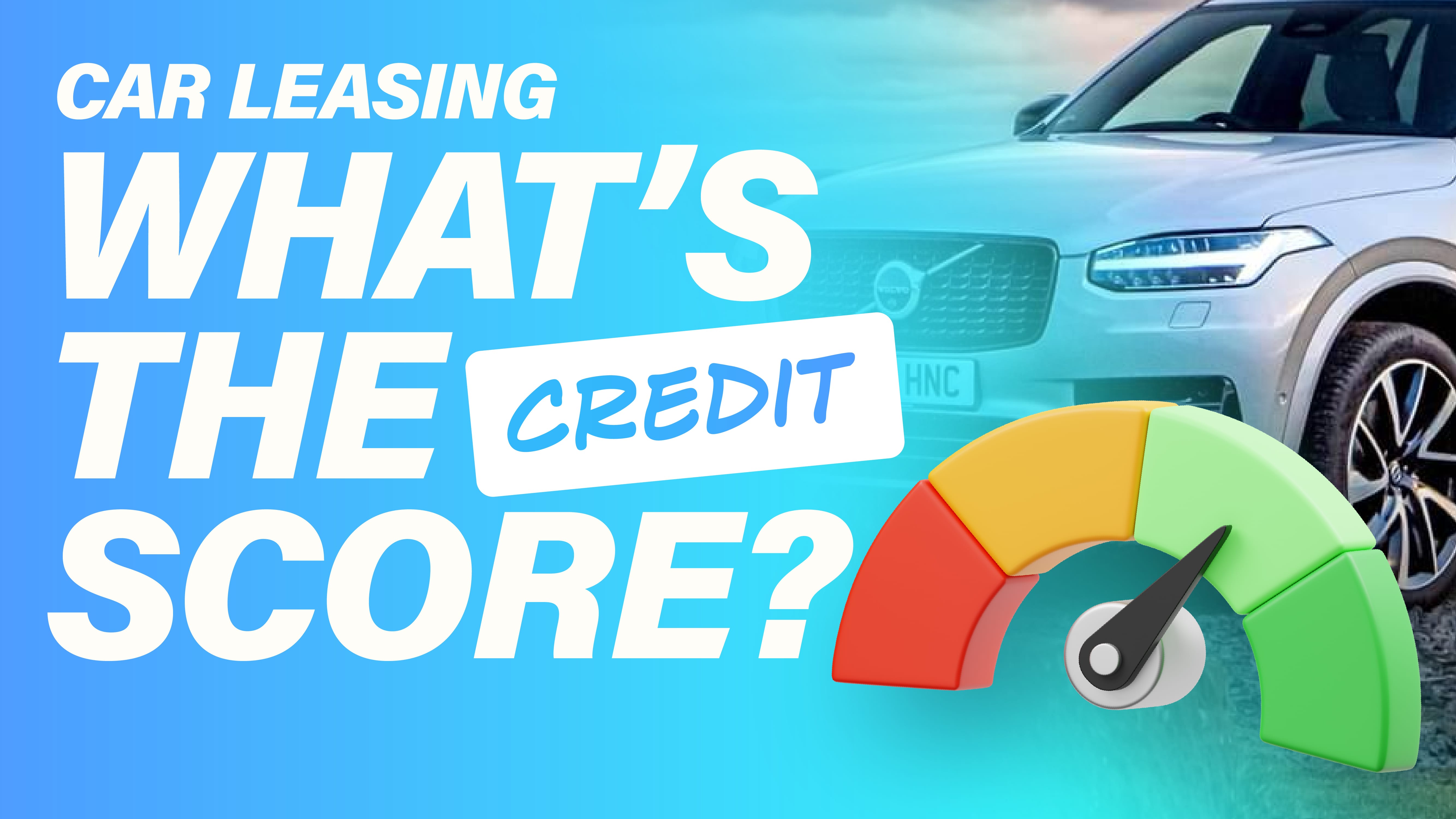What credit score do you need to lease a car?
How to check, manage and improve your credit score.

Can you lease a car with a bad credit score?
In short, yes, but ideally you want a good credit score to access the best deals.

Watch our video -
Why is it that when most of us hear the words ‘credit score’, we go into panic mode?
People think “I won’t be accepted” or “my score isn’t high enough” - sometimes it’s enough to put you off even looking into it.
But bad credit isn’t the end of the world - and chances are, yours isn’t as bad as you think. In this guide, we’re going to go through how it works in the world of car leasing and how you can secure your dream car either way.
01
Simply put, a credit rating is a numerical representation of your “creditworthiness”
It reflects your financial history and your ability to manage debt responsibly. It’s a three-digit score, and it can significantly influence your financial opportunities, including the ability to lease a car.
It’s determined by various factors that showcase what they call your financial behaviour. Things like your payment history, the amount of debt you owe (aka credit), the length of your credit history, new/recent credit checks, and the types of credit you have.
They take all of this information, analyse it, and this is what forms the basis of your credit score. In the end, you’ll be given a number which will fall into one of the following categories:
Very poor 🤬
Poor 😠
Fair 😒
Good 😊
Excellent 🤩
Something to note is that whenever a credit check is performed, it leaves a mark on your credit report.
That said, it’s important to point out that there are two types of credit checks: a hard check and a soft one.
Hard searches, usually what you’ll have with any credit applications, can have a negative impact on your credit score.
On the other hand, soft searches, often made for background checks or pre-approvals, won’t affect your credit rating.
Let's get into why your credit rating matters when it comes to car leasing.
02
What constitutes a good credit score?
Your credit rating plays a pretty important role in determining the lease options available to you, including the type of vehicle, lease terms, and available options. It's no secret that having bad credit can lead to higher costs and limited choices in any process, and the leasing process is no different.
And in the world of car leasing, an 'excellent' credit score is often your route to more favourable terms and lower costs.
When the lease company runs their checks, they use credit reference agencies to look at your history (people like Experian, Equifax, and TransUnion). Each of these agencies uses different scores, so if you're checking your score on each of these, the number you want is:
Experian: 721+
Equifax: 531+
TransUnion: 566+
That said, it'll usually say the word "good"!
However, it's important to understand that your credit score is not the sole deciding factor.
Affordability plays a huge part in the application process, which assesses your ability to comfortably make the monthly lease payments when considering your current financial obligations and expenses.
You could have the best score in the world, but if you cannot demonstrate that you can afford it, you won't be approved.
To check yours, visit one of the agencies mentioned above. We'd recommend Experian, but any of them will give you a good idea.
03
Can You Lease a Car with a Bad Credit Score?
Yes, you can. It’s challenging, but it’s possible, and there are options available.
When people come to Motorlet with poor credit, we’ll explore alternative avenues for individuals with lower credit scores.
Things like subprime leasing.
These leases may come with higher rates or require larger upfront payments, but they provide an avenue for those with imperfect credit histories.
Then some lease companies will consider there’s guarantors.
Someone who essentially vouches for your lease and takes on the responsibility if you fail to make payments.
And the third option is Special Financing Programs.
Certain manufacturers and dealerships offer special financing programs aimed at individuals with poor credit. Although, these are becoming pretty rare.
It’s worth noting that there are often limitations to these.
Things like higher costs, limited vehicle selection and stricter lease terms - but we can run through that if and when it gets there.
The good thing is though, a credit score isn’t static and there are things you can do to improve it.
So if your credit score isn't where you'd like it to be, don't stress out.
Responsible credit behaviours like making your payments on time and keeping credit card balances low all work towards improving your score.
04
How can you improve your credit score
The easiest way and the first thing you should check, is to make sure all of your information is correct. Current address, marital status, and the big one, make sure you are on the electrol role - this can sometimes be the difference between being approved or declined.
Next, make sure your credit card balances are as low as possible. The lenders will see if you've got credit card debt. The more you've got, the more chance of it hindering your approval chances.
Try to limited the amount of applications you have ongoing over a short period.
And the most obvious one, make sure you're not missing payments and you're on top of any credit you do have outstanding.
Do these things and you will see your score improving - it won't happen over night, but it will happen.
05
What causes a credit check to fail?
There are a few things, starting with the obvious - missing payments, which is usually the main cause of a bad credit score.
If you have a history of late payments (or worse, a record of bankruptcy or CCJs), then there is a good chance a lease company is not going to accept you. We'd recommend getting this straightened out before trying to lease a car.
Affordability is another big one. If you've already got a load of credit elsewhere (credit card, mortgage, loan, etc), the lease company might not accept you.
Other things that might affect it include lack of documents, UK residency, and traceability.
Credit FAQs...
What credit score do I need to lease a car?
To get the best lease deals, you really need a 'good' credit score. However, there are options available if your score is fair or poor.
Can I lease a car with bad credit?
In short, yes you can, however, you might be limited when it comes to offers. The likelihood is, you won't be able to access a lot of lease deals you see advertised. Get in touch to find out your options.
How does leasing a car affect my credit?
Leasing a car affects it the same way as other forms of credit. Credit companies will be able to see you've got a commitment (the car lease) and what you owe. If you make payments consistently on time, this can have a positive impact.
Can I lease a car with a CCJ?
It's not impossible, but it will limit your options. If you have a CCJ, get in touch and we can discuss what is available to you.
Will applying for multiple lease deals affect my credit score?
Yes. The more you apply, the more hard searches will be carried out on your credit record, which can have a negative impact.
Will leasing a car affect my mortgage?
Yes, taking out a car lease can impact your ability to get a mortgage (or other types of finance), as they'll be able to see you've committed to a lease payment.
What income do I need to lease a car?
When it comes to affordability, it boils down to this: can you reasonably afford the lease cost after your current financial commitments and expenditures have been factored in? If the answer is yes, then your income is probably enough.
Can someone take the lease out for me?
No, someone else cannot lease the car for you.
At Motorlet, we all understand the worry that credit ratings can create in your car leasing journey.
We’ve all seen it hundreds, if not thousands, of times.
And I want to reassure you that we’re here to help with absolutely zero judgment.
We can help you assess your likelihood of approval and identify lease companies most likely to approve your application.
If you found this video helpful, I’d really appreciate you tapping the like button or subscribing for more leasing content.
And remember, whether you’ve got good or bad credit, Motorlet is here to support you every step of the way if you decide to lease with us.
What's next?
Enjoyed this? Read our latest news

EV Myths Debunked
In this guide, we debunk the biggest EV myths so you can get the real facts and decide if an electric car is right for you!

Should You Lease or Buy an Electric Car?
This comprehensive guide breaks down the financial implications of both options, helping you understand which approach makes the most sense for your situation.
Are Electric Cars Cheaper to Lease?
Considering an electric vehicle but unsure about leasing versus buying? Our Electric Leasing Guides break down everything you need to know about EV financing options.
Customer Stories
We've helped over 1,000+ customers find their dream car, hear what they have to say.
Read more reviews“As usual, top class service. The team at Motorlet provided first class service from beginning to end with the friendly helpful expertise of Josh and Wendy. Will continue to use their services as I have done for the past six years...” Keep reading
Diane Parish | Audi Q5

New deals weekly
Subscribe to get the latest offers, guides, new, and more, straight to your inbox.


















